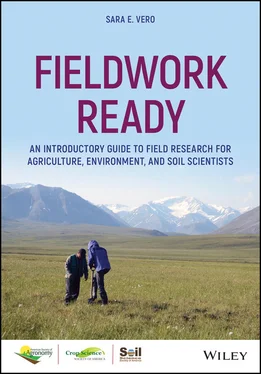9 Do I have the equipment?Equipment includes tools, safety gear, appropriate clothing, machinery, and sampling or measurement devices that you will need during your field study. Don't assume your research center will have exactly what you need, and be very wary if someone tells you “Oh, we have one of those in the shed…” Stored equipment should always be carefully examined and tested to see that it is functioning correctly and can actually supply the results you need. Sometimes older equipment can be repaired or refurbished if it has only minor damage. Often simply replacing dry and cracked tubing, O‐rings, and other rubberized components is all that is required as these parts tend to degrade in storage. Check whether such equipment has been surpassed by more modern devices. These may offer superior measurements, greater ease of use, or will be more understandable to the modern readers of your studies.If you are purchasing new equipment or if you have several different devices at your disposal that measure the same variable, it is a good idea to speak to an expert who thoroughly understands the various approaches and can advise you as to which would best serve your purpose. It's vital to do your background research also. Typically, newer methods or devices will be tested against the older, more established approaches. Look for peer‐reviewed research on your intended methods and consider emailing the corresponding author if you have further questions.If equipment does become damaged, think carefully before attempting to repair it. Some items can be repaired relatively easily, but don't assume that you have the skills to do so unless you have been appropriately trained. This is particularly true for equipment which has mechanical or electronic components. Equipment is often purchased with warranties and service agreements. Check that you will not invalidate these by tampering with the device! For “simple” repairs or maintenance, such as replacing hoses or cleaning sensors, consult the manuals and use the correct tools. Much hardship and frustration can be saved by reading the instructions before you take things apart!If your research institute has equipment that is available to many different people, be sure to check with whoever is responsible for its storage or maintenance before you take it. There may be a schedule or roster for its use and taking equipment without following the proper routine can infringe on other people's work. Remember, your project is no more or less important than theirs! Always return used equipment in a timely manner and in good condition.Clean tools after you have used them and put them in their proper place ( Fig. 1.10). Be respectful. Fig. 1.10 Always clean and store equipment properly after using it. Don’t leave it in poor condition for the next person.Source: Sara Vero.
10 Do I have the skills?It will probably be obvious that you will need the scientific skills related to applying your treatment, and correctly collecting, processing, storing, and analyzing your samples. These skills will often be learned at your university, through on‐the‐job training, by reviewing standard operating procedures (SOPs), or by seeking specific training via workshops, courses, or online. Think about what other skills you might need that are not “scientific” in nature but will be required. For example, can you read a map, mark out plots accurately, drive off‐road, pull a trailer, use essential machinery, etc. The list is endless! Some tasks may not only require that you can do them, but also that you have training, licenses, and/or approval from your institute or under the law. Driving skills come under this category.Where you are lacking certain skills, you have three options.Learn – The major advantage here is that you can accrue new abilities that will help you in your future research or work and this should always be a priority throughout your career, particularly in the early stages. However, in some instances it may be too time‐consuming or inefficient from a cost perspective and it would be better to seek assistance ( Fig. 1.11).Teamwork – Much of the best research is done in teams and collaboration is one of the most important abilities a researcher must establish ( Fig. 1.12). Fieldwork is an excellent way to learn this and allows more ambitious and comprehensive studies than are usually possible by one or two individuals in isolation. We will discuss later how to organize your team.Contractors – Some tasks are better outsourced to people or agencies who specialize in this area. This could be because it is a once‐off task and it may not be worth your time developing, or it could be that the task is so specialized that it requires an expert. Machinery use also is often best outsourced. Hiring a crane operator, for example, will likely be preferable than learning to use one and then renting the crane itself! Liaising with contractors is essential to ensure that everyone knows their task, is in agreement regarding the price and will be at the right place at the right time. Fig. 1.11Collaboration in the field is a great opportunity to learn new skills from experienced researchers.Source: Brandon Forsythe. Fig. 1.12Sometimes additional help may be necessary. This team is working together to handle large, awkward equipment.Source: Katie O’Reilly.
11 What training do I need?Methods and equipment – You should be confident that you understand all of the methods and equipment you intend to use both in theory and in practice. While reading the manual is an important starting point, it is not always enough! Remember the six Ps–Proper Planning and Practice Prevent Poor Performance.Health and safety – Check your institutional policies before commencing either field or labwork. There are often mandatory requirements regarding manual handling training, basic first aid, biosecurity, or other health and safety protocols. You may also consider specific training that might be relevant to your intended research ( Fig. 1.13). For example, if you are researching infection rates of toxoplasmosis in urban feral cats you might need training in animal handling, zoonosis, and ethics relating to research with animal subjects. Research institutes typically are very supportive of training, especially on health and safety issues.Training takes time. This should be accounted for in addition to the fieldwork itself as it should be completed before you venture into the outdoors. Although fieldwork is certainly an opportunity to learn and develop new skills, the first time you try a new technique, tool, or idea should never be during the “live event,” when you need everything to run smoothly.Don't underestimate the value of informal practice. Set aside some time to trial run your equipment and techniques. This will ultimately save time in the field, prevent damage to equipment, allow effective measurements, and prevent a great deal of frustration. Fig. 1.13You may need training in safety protocols. For example, the researchers investigating prairie burning in this photo from Konza Prairie, Kansas, have training in fire safety and emergency response.Source: Jesse Nippert.
12 What assistance do I need?Broadly speaking, there are two factors to consider when determining how many people you need on your team and who they should be.Skills – Often you will require specific skills on your team that include experience, specialist training and equipment, expert knowledge or all of these factors. In these situations, it may be best to recruit someone to your team who has these skills. For example, if you are primarily a hydrochemist studying pesticide transport to groundwater and you need an accurate characterization of the soil profile, you probably should seek the assistance of a pedologist with both training and experience. This is a great opportunity to learn from these individuals.Labor – Many hands make light work and furthermore, some jobs are simply not safe and/or possible for a single individual. An example from my own research is a series of river surveys during low flow. In that study, I needed approximately 50 water and sediment samples from across entire river and tributary networks, and they needed to be taken in the space of roughly 4 h. Alone, that would have been completely impossible. However, the sampling methodology was relatively simple and needed only brief training. From my research center, five people lent their assistance each day. We met each morning, I assigned everyone a specific stretch of river and the team regrouped once their samples had been collected. The density and tight timing of sampling could never have been achieved with fewer people, no matter how skilled or motivated.Students and researchers are generally helpful and enthusiastic. Most researchers can probably relate plenty of stories of teamwork generously and freely volunteered between friends. I can list a dozen friends and colleagues who readily contributed their time and effort during my PhD alone. Collaboration is built on reciprocation. Depending on an individual's contribution they may merit inclusion as a co‐author, a collaborator, in acknowledgments, or by some other recognition of their input. This can only be determined on a case‐by‐case basis and should be reviewed in light of your institutional policies. When possible and appropriate, try to contribute your skills and assistance to others in return.Outside of collaborators, you may need to hire assistance. This is especially true where skills or equipment are outside of your expertise. For example, if you need electricity to feed a river bankside analyzer this should not be considered to be an opportunity to become an electrician! This needs skill, experience and tools both to do the job correctly and to safeguard your health and that of your team. Hire a registered electrician!
Читать дальше












